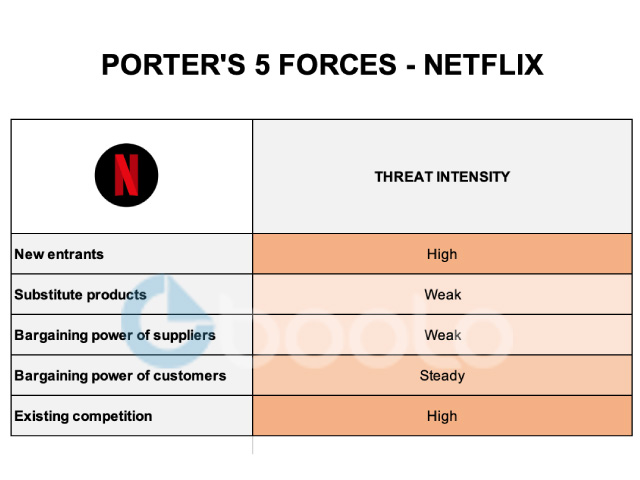Numerical introduction
One of the main problems the platform also has is the number of fraudsters, which seems to be much higher than among its competitors. Thus, nearly 100 million households could have access to Netflix programs without paying a single penny, thanks to illicit code sharing between Internet users. The group spends more than $20 billion on investments and researching new content. Netflix is still one of the platforms that offer the newest content as well as more world-famous series. In 2022, the net profit was 1.6 billion dollars, with a stock market discount of nearly 25%. In France, the turnover of the platform is 1.5 billion euros.
Porter's 5 forces analysis
| Porter's Forces | Threat Intensity |
| New entrants | High |
| Substitute products | Weak |
| Bargaining power of suppliers | Weak |
| Bargaining power of customers | Steady |
| Existing competition | High |
Explanations
The new entrants
The players who wish to position themselves in the video streaming market remain relatively numerous, even if those in place are already very popular in France and around the world. Despite the perceptible decline of Netflix, especially in recent months, the platform remains one of the main leaders in the segment. The VOD segment is a fairly easy market to access. The barriers are not insurmountable. This is why new entrants are gradually making their way into the market, of course, by broadcasting different content than that offered on Netflix. Unpublished content is the one that works best and which is developing more and more, especially in the form of series, since these are the ones that consumers have watched the most in recent years. Thus, in 2022, more than 80% of Internet users say they prefer to watch series over films. Nevertheless, special attention should be paid to the relative ease of entering the market. Indeed, it is not always easy to find new content that is, above all, in line with the expectations and needs of consumers constantly changing expectations. The market is certainly accessible, but the necessary investments are very high. Admittedly, in the long term, the arrival of new entrants can pose a real threat to Netflix which, as its results tend to prove, cannot rest on its laurels. It will undoubtedly be important in the near future to develop the platform's services to convey a more dynamic image and thus regain its monopoly.
Substitute products
Substitute products remain rare, given the trends that society reflects. Indeed, more than 60% of the population uses a streaming platform, which shows actual consumption habits. It seems today, and as has been for several years now, that consumers are watching less and less television. Indeed, the only thing that could really replace platforms like Netflix are applications allowing you to watch programs on repeat but not television itself. Consumers prefer these platforms where there is no advertising and where, above all, they can view their content whenever they want. There are, of course, other substitutes in the form of DVDs or movie shows, but the comparison doesn't really seem relevant. Even if the customers use all these means, it does not prevent them from connecting on Netflix. They are not really substitutes but rather one-time complements. Even if the prices offered by Netflix may seem high to some consumers, it is important that they can watch them on as many media as they wish and this represents a considerable advantage for users. Even when we refer to streams from major TV channels, the comparison lacks relevance because there is a lot of advertising.
The bargaining power of suppliers
The providers on this type of platform can be vast, and this is often the case when they have just started their services. Netflix has already been weakened by the presence of suppliers because, in order to be able to broadcast content on the platform, you have to buy a certain number of rights, whether for films, series or documentaries. Everything is subject to copyright, and suppliers do not hesitate to negotiate these rights. Netflix may find itself in a weak position since the platform wants this content to increase customer satisfaction and therefore gain additional subscribers. Suppliers negotiate prices, but also all broadcasting conditions. Some films only stay on the platform for a fixed period.
Today, Netflix is no longer really dependent on its suppliers since the original content of the platform means that it is the company that broadcasts and creates its own content. Netflix is thus its own provider. All the expenses that were initially related to the search for content via suppliers, are now used to improve the brand image but also the competitiveness of the company.
The bargaining power of customers
The more choices customers have, the more their bargaining power increases. The competition is fierce, and platform users can opt out with just a few clicks. Nevertheless, today, customers don't seem to have as much bargaining power. Despite the decline in the number of subscriptions, Netflix continues to offer exclusive and, above all, personalised content. Netflix is a company that interacts a lot with its customers on the internet and, in particular, on social networks. Indeed, the group is present to promote its new content, and when users connect to the platform, they can have direct access to new content based on what they have already seen. Customers today are not in a dominant position in the streaming market because they are mainly looking for the platform that has the most content and are ready to spend a few more euros for it at the end of the month. Netflix has the major advantage of really targeting the whole family, with diversified content for everyone.
The existing competition
The threat is very high. The main competitors of Netflix are Amazon Prime, Disney plus, HBO, CBS, Hulu and all the replay platforms that belong to the major television channels. Apple TV and YouTube are also among the competitors. Over time, these rivals tend to be more and more of a threat because they themselves provide various content and, therefore, become more competitive, attracting more people. If we take the example of Amazon, the Prime offer includes various services linked to the site, which is already an advantage since, with the Prime subscription, users are entitled to faster deliveries, music, and video on demand, as well as digital books. In the future, Netflix will also have to diversify its services, not just the content, in order to gain notoriety and competitiveness. As we mentioned above, it is also the most pirated platform, which forces the company to take measures to ensure that everyone watches the content by paying, which would increase its turnover.
Despite a sharp drop in results in recent months, Netflix remains one of the favourite platforms. Thanks to its exclusive and frequently renewed content. The platform appeals to Internet users. Unfortunately, strong competition in the sector, the conflict between Ukraine and Russia, as well as the increasing number of fraudsters put the group in a difficult position. Porter's strength analysis tends to highlight the main threats, which are competition and potential new entrants. The bargaining power of customers remains stable, while that of suppliers has become almost non-existent since Netflix created its own content. Substitutes are also a small threat in a world dominated by new technologies and ad-free content.
Sources : Statista, Elle









